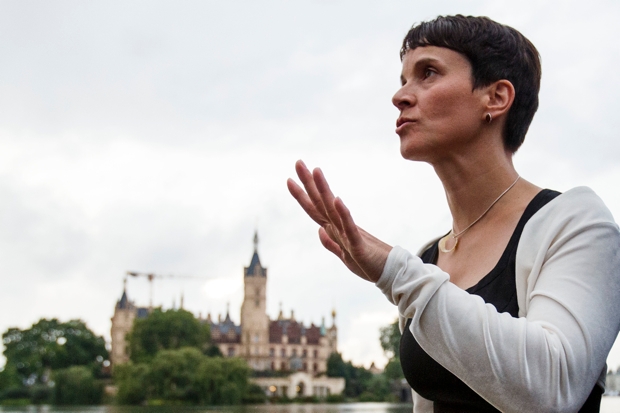‘When the world ends, I’ll go to Mecklenburg,’ quipped Bismarck, ‘because there, everything happens a hundred years later.’ Mecklenburg-Vorpommern has always been seen as somewhere behind the times, but has this sleepy backwater now become a portent of momentous things to come? In last weekend’s regional elections, Germany’s fledgling anti-immigration party, Alternative für Deutschland, came second, pushing Angela Merkel’s CDU into third place – in her own constituency. So was AfD’s Leif-Erik Holm right to say that this could be the beginning of the end for Merkel? And does this shock result mark the end of the beginning for AfD?
I have a soft spot for Mecklenburg (my father’s family used to live there) but as a fairly frequent visitor, for me this result came as no surprise. One of the five East German Lander which joined the Bundesrepublik after reunification, it’s a place that sums up the successes and failures of Eastern Germany. It’s also a place with intriguing parallels with Brexit Britain.
With its historic Hanseatic towns and wild sandy beaches, Mecklenburg-Vorpommern has become a big draw for tourists, and if you go there as a tourist it’s easy to assume that everything is hunky dory. Since reunification, these coastal resorts have been beautifully restored. However if you venture further inland, where fewer tourists travel, you’ll find a different story. It’s like travelling back in time, to the early 1990s and the immediate aftermath of Communism. Here, instead of boutique hotels and funky cafes, you’ll find deserted high streets and derelict factories. You can see why this is Germany’s poorest province, with 11.5 per cent unemployment (well over twice the national average). You can also see why AfD polled over 20 per cent here.
Alternative für Deutschland speaks for the growing number of German voters who are increasingly worried about immigration, and find no outlet for their concerns in Germany’s mainstream parties. Barely three years since it was founded, AfD already boasts representatives in nine of Germany’s 16 provincial parliaments. Last March, in Sachsen-Anhalt (another East German province beset by similar social problems as Mecklenburg, but without the benefits of a burgeoning tourist industry) the party polled over 24 per cent.
Ironically, like a lot of places in Britain that voted Leave, Mecklenburg-Vorpommern has actually been relatively unaffected by immigration – so far. Of the 1.1 million refugees who came to Germany last year, only 25,000 ended up here. But if Britain’s Leave campaign proved anything, it’s that fears about immigration, real or imagined, are mainly about the future. For Britain, read Germany. Now that Deutschland’s migrant crisis has abated somewhat, AfD’s focus has shifted to the threat of Islamification, an issue with real traction throughout Germany, not just in the poorer East.
So how big can AfD become? And should Germany – and the rest of us – be worried? At the last national elections, in 2013, the newly formed party polled 4.7 per cent of the vote, only just missing out on the 5 per cent required to enter parliament. In next year’s national elections, with dissatisfaction growing and Merkel’s popularity waning, it looks highly likely they could cross that 5 per cent threshold. They now have a charismatic leader, Frauke Petry, a 41 year-old mother of four who was born and raised in East Germany, came to West Germany as a teenager, and read Chemistry at Reading University. Some of her party’s European policies seem positively benign by British standards: an end to ‘ever closer union’ and a referendum on the Euro.
Despite her alliance with Austria’s notorious Freedom Party, Petry strives to present her party as respectably ‘liberal-conservative.’ However her mainstream stance is regularly undermined by a good many of her members. Cringeworthy instances abound. To cite just one example, the party’s vice chairman, Alexander Gauland, told the Frankfurter Allgemeine Zeitung (Germany’s newspaper of record) that no German would want black German footballer Jerome Boateng (a brilliant sportsman and a model citizen) as a neighbour. Charming. No wonder no other party will work with them. Will Alternative für Deutschland enter parliament in 2017? Quite possibly. Will they be part of any coalition government? Fat chance.
Yet the fact of the matter is that German democracy needs politicians who will discuss migration and Islamification, and if the mainstream parties won’t do it, parties like AfD will fill the void. Personally, I believe the worst is already over, that last year’s refugee surge will subside, and that in the long run many of these migrants will provide an economic boost for Germany, not least in Mecklenburg-Vorpommern, with its ageing, shrinking population. However there are clearly lots of Germans who don’t feel this way at all, and they deserve a voice, and responsible politicians to represent them.
The success of AfD is really the failure of Merkel’s CDU. It is an example of what happens when mainstream conservatism neglects its core voters, and it will ultimately see Angela Merkel replaced by a leader who takes a tougher line on immigration. Merkel has been a brilliant leader, bestriding Germany, and Europe, like a colossus, but she’s now led her party for sixteen years, the last eleven as Chancellor. Now even Der Spiegel, one of her most loyal advocates, has suggested that it may be time for her to step down. Like Ukip in the UK, AfD’s most significant legacy will not to be to win power, but to force governing conservatives to move further to the right.






Comments